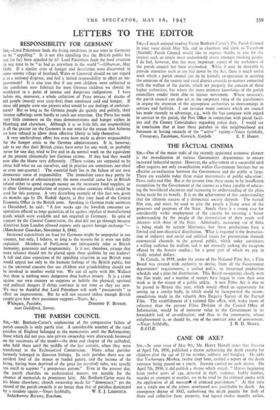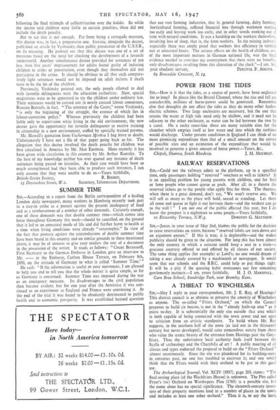CANE OR AXE?
SIR,—In your issue of May 9th, Mr. Henry Howell states that lzvestia of April 7th, 1936, published a decree authorising the death penalty for children after the age of 12 for murder, robbery and burglary. He adds that Vechernaya Moskva, twelve days later, carried a report of the death sentence being passed on a youth. Izvestia carried no such decree. On April 7th, 1936, it did publish a decree -which stated: " Minors beginning from twelve years of age, detected in theft, violence, bodily injuries, murder or attempts at murder, are to be tried by the criminal courts with the application of all measures of criminal punishment." At that time not a single one of the crimes mentioned was punishable by death. An emergency decree of 1932, authorising the death penalty for theft of State and collective farm property, had lapsed twelve months earlier,
following the final triumph of collectivisation over the kulaks. So while the decree said children were liable to certain penalties, these did not include the death penalty.
But to say that is not enough. Far from being a retrogade measure, this decree was, in fact, a progressive one. Izvestia, alongside the decree, published an article by Vyshinsky, then public prosecutor of the U.S.S.R., on its meaning. He pointed out that this decree was one of a set of measures based on the need for checking the development of a juvenile underworld. Another simultaneous decree provided for sentences of not less than five years' imprisonment for adults found guilty of inducing children to crim•: or prostitution, even though they themselves did not participate in the crime. It should be obvious to all that such compara- tively light sentences would not be imposed on adult inciters if death were to be the lot of the children.
Previously, Vyshinsky pointed out, the only people allowed to deal with juvenile delinquents were the education authorities. Now, special magistrates were to be appointed to try the children under ordinary law. Their sentences would be carried out in newly created labour communes, Russian Borstals, in fact. " The sentence of the Court," wrote Vyshinsky, "is only the beginning of the struggle, the essence of which lies in labour-correction policy." Whereas previously the children had been liable only to supervision while living in the old environment, the new decree gave the opportunity for juvenile delinquents to receive training in citizenship in a new environment, staffed by specially trained persons.
Mr. Howell's quotation from Vechernaya Moskva I beg leave to doubt. Unfortunately I have not a file of that paper going back so far. The allegation that this decree involved the death penalty for children was first circulated in America by Mr. Max Eastman. More recently it has been given wide circulation in this country by Mr. Arthur Koestler. To the best of my knowledge neither has ever quoted any instance of death sentences being passed on juveniles. As their case would have been so much strengthened had they been able to produce such instances, I can only assume that they were unable to do so.—Yours faithfully, is Devonshire Street, W.r. Secretary, Information Department.



































 Previous page
Previous page